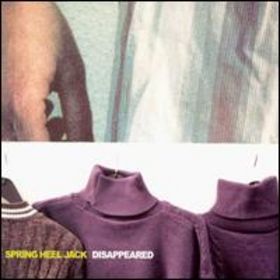Electronica is both a broad group of electronic-based music styles intended for listening rather than strictly for dancing and a music scene that came to prominence in the early 1990s in the United Kingdom. In the United States, the term is mostly used to refer to electronic music generally.
Jungle is a genre of electronic music that developed out of the UK rave scene and sound system culture in the 1990s. Emerging from breakbeat hardcore, the style is characterised by rapid breakbeats, heavily syncopated percussive loops, samples, and synthesised effects, combined with the deep basslines, melodies, and vocal samples found in dub, reggae and dancehall, as well as hip hop and funk. Many producers frequently sampled the "Amen break" or other breakbeats from funk and jazz recordings. Jungle was a direct precursor to the drum and bass genre which emerged in the mid-1990s.

Spring Heel Jack is an English electronic music duo, consisting of John Coxon and Ashley Wales.

Earthling is the 21st studio album by the English musician David Bowie, released on 3 February 1997 through RCA Records in the United Kingdom, Virgin Records in the United States, and Arista Records/BMG in other territories. Mostly self-produced by Bowie, it was primarily recorded from August to October 1996 at New York City's Looking Glass Studios. Bowie composed the tracks with Reeves Gabrels and Mark Plati, who are credited as co-producers, with Mike Garson, Gail Ann Dorsey and Zack Alford providing overdubs later.

Blur is the fifth studio album by the English rock band Blur, released on 10 February 1997 by Food Records. Blur had previously been broadly critical of American popular culture and their previous albums had become associated with the Britpop movement, particularly Parklife, which had helped them become one of Britain's leading pop acts. After their previous album, The Great Escape, the band faced media backlash and relationships between the members became strained.

13 is the sixth studio album by English alternative rock band Blur, released on 15 March 1999. Continuing the stylistic shift away from the Britpop sound of the band's early career, 13 explores experimental, psychedelic and electronic music.

Endtroducing..... is the debut studio album by American music producer DJ Shadow, released on September 16, 1996, by Mo' Wax. It is an instrumental hip hop work composed almost entirely of samples from vinyl records. DJ Shadow produced Endtroducing over two years, using an Akai MPC60 sampler and little other equipment. He edited and layered samples to create new tracks of varying moods and tempos.

Orbital is the second studio album by English electronic music duo Orbital, released on 24 May 1993 by Internal and FFRR Records. Like the duo's debut album, the album was officially untitled.

M2M were a Norwegian pop duo comprising Marit Larsen and Marion Raven. Larsen and Raven had been friends since the age of five, and formed a music duo when they were eight. They released a children's album in 1996 when Larsen was 12 and Raven was 11, under the name "Marit & Marion". The album was nominated for a Spellemannprisen award and the band changed their name to M2M after signing a record deal with Atlantic Records in 1998. M2M were frequently praised for writing most of their songs and performing their own instruments, something which was considered to set them aside from the majority of teen pop music artists.

Risqué is the third studio album by American disco band Chic, released on Atlantic Records on July 30, 1979. One of the records that defined the disco era, the album became highly influential not only within the movement, but also in other styles such as hip hop, art rock and new wave. In 2020, Rolling Stone ranked the album at number 414 on their list of the 500 Greatest Albums of All Time.

In Sides is the fourth album by British electronic group Orbital, released in the UK on Internal on 29 April 1996. The album's title is a reference to the fact that the original vinyl LP release of the album was as a 3-LP vinyl box set, with one track per side of each disc. In Sides saw the band continue the process, begun on their previous album Snivilisation, of moving away from making music for the rave scene towards more intricately crafted melodies and reflective, downtempo tracks. Gathering widespread acclaim not just from dance music magazines but also the UK's more traditional rock music papers such as NME and Melody Maker, the album is considered by many reviewers and fans to be among Orbital's best work.

Money Jungle is a studio album by pianist Duke Ellington with double bassist Charles Mingus and drummer Max Roach. It was recorded on September 17, 1962, and released in February 1963 by United Artists Jazz. All but one of the compositions were written by Ellington, with four of the seven on the original LP being recorded for the first time on this album. Later releases on CD added eight tracks from the same recording session.

Jungle Fever is a soundtrack album by American R&B singer-songwriter, producer, and multi-instrumentalist Stevie Wonder, recorded for the film Jungle Fever. It was released by the Motown label on May 28, 1991.

Sinking is the second studio album by British electronica band The Aloof, released by East West Records in the United Kingdom on 27 May 1996. Following the rave-influenced style of the group's debut album Cover the Crime (1994), Sinking brought the band into a darker, more mellow direction, as the result of the group's desire to deliver a "band" feel, aided by the members' newfound disillusionment with club culture. The record fuses styles of techno, dub, trip hop and jungle music and incorporates string arrangements and sombre lyrics.

Disappeared is an album by English electronic duo Spring Heel Jack. The album was released by Thirsty Ear on 22 August 2000.

Love Tracks is the sixth studio album by Gloria Gaynor, released in November 1978 on Polydor Records. It reached number four on the US Billboard 200 and includes Gaynor's biggest hit and only number-one single, "I Will Survive".
Techno is a genre of electronic dance music which is generally produced for use in a continuous DJ set, with tempos being in the range of 120 to 150 beats per minute (BPM). The central rhythm is typically in common time (4/4) and often characterized by a repetitive four on the floor beat. Artists may use electronic instruments such as drum machines, sequencers, and synthesizers, as well as digital audio workstations. Drum machines from the 1980s such as Roland's TR-808 and TR-909 are highly prized, and software emulations of such retro instruments are popular.

Bridge over Troubled Water is the fifth and final studio album by American folk rock duo Simon & Garfunkel, released on January 26, 1970 on Columbia Records. Following the duo's soundtrack for The Graduate, Art Garfunkel took an acting role in the film Catch-22, while Paul Simon worked on the songs, writing all tracks except Felice and Boudleaux Bryant's "Bye Bye Love".

"Walking Wounded" is a song by English musical duo Everything but the Girl. Member Ben Watt wrote the song's lyrics while electronic music duo Spring Heel Jack composed the music and produced the track. The song appears on Everything but the Girl's ninth studio album, Walking Wounded (1996), in two different versions: the album version as track five and the Omni Trio remix as the final track. It was the duo's first single release on Virgin Records, as their previous label, Blanco y Negro, had dropped them before the Todd Terry remix of "Missing" became a worldwide hit.

Amplified Trio is an album featuring the Dutch drummer Han Bennink, along with John Coxon and Ashley Wales of the electronic music duo Spring Heel Jack. Released in 2007, the album was produced by Treader, a label operated by Coxon and Wales.

















